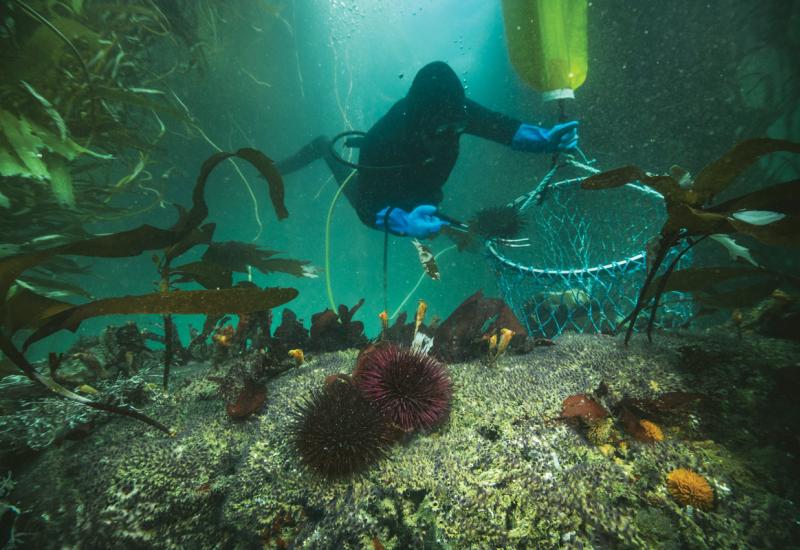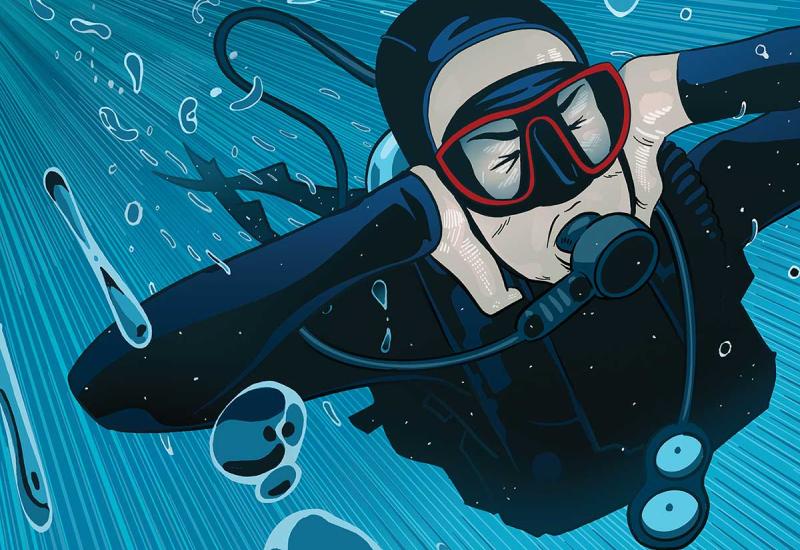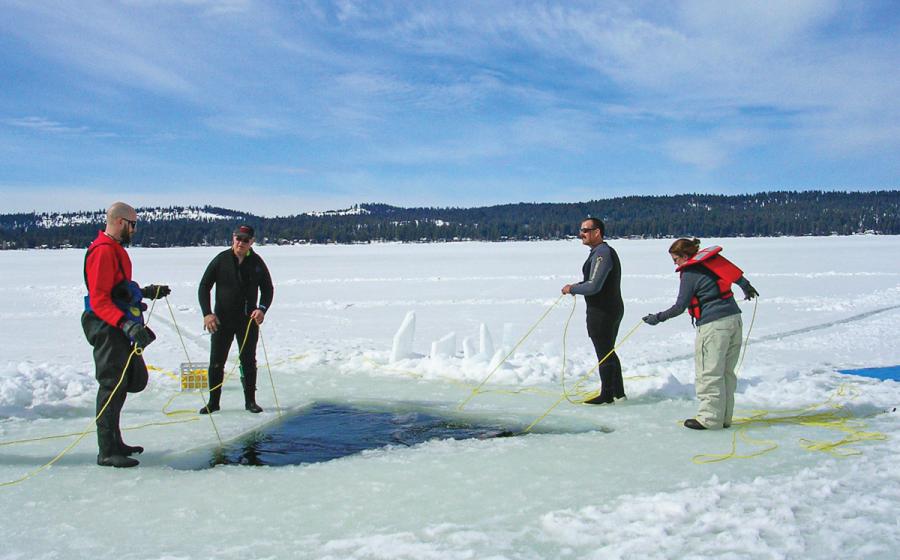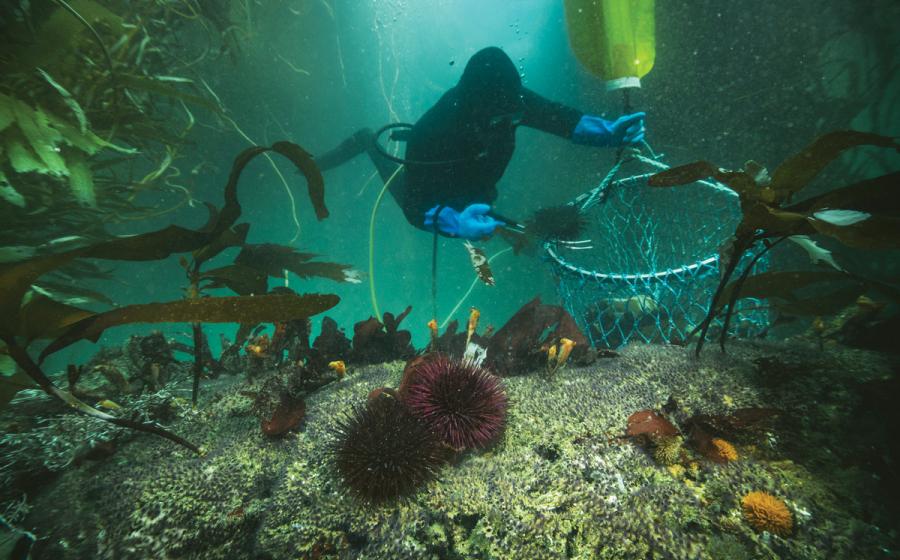Into the Dark | Lessons for Life

Miko MaciaszekINTO THE DARK
The thrill of the hunt leaves one diver speechless — and alone — on his first night dive.
Lobster fever was in the air for Rex and his friends. There were five divers in their group, and they were all looking forward to bringing lobster home for dinner. During the boat ride to the dive site, the friends discussed the best ways to get the lobsters out of their holes and how to measure them to adhere to legal limits. The one thing they didn’t discuss was how to make a night dive. It was Rex’s first time diving after dark and he was concerned, but there was no way he was going to ask anyone about it. That would be embarrassing.
THE DIVER
Rex was 27 and had been diving off and on for five years, but he had never bothered to keep a logbook of his experience. He dived only for a specific purpose, not for the fun of diving, and didn’t seek additional training or practice skills. He was a natural in the water and confident he could handle anything that happened. He was strong and fit with no health issues.
THE DIVE
Diving from a private boat, the five friends had agreed to enter the water just after midnight, as soon as they were allowed to take the lobsters. Rex’s friends talked about the fun they had during lobster season all the time, and Rex had wanted to join them. He loved listening to their stories and was even more excited about the dive as they headed toward their “secret spot.” When they arrived, each diver geared up by himself, checking to be sure that they had their lights and lobster-hunting tools. They each performed a back-roll entry into the water and then gathered together by the boat’s stern. The boat was tied off to a mooring ball, but there was a marker float about 50 feet away they planned to use as a descent line. It floated above a small coral outcropping in the sand. That was where they expected to find the lobsters.
THE ACCIDENT
This was Rex’s first night dive, but he didn’t tell his friends — he was afraid they might not let him go along if they knew. Back rolling from the small boat and hitting the water upside down confused Rex for a moment, but he got himself under control. He joined the other divers, and they began swimming toward the distant descent point. Rex’s friend briefed the dive, and everyone agreed to swim on the surface and descend together. Rex joked about getting to the lobsters first, but no one gave it much thought.
Rex was struggling to stay afloat. He didn’t think to make himself positively buoyant by adding air into his BC, and none of his buddies paid any attention to him. They were too focused on their own plans for the dive. Rex decided he would be more comfortable underwater and allowed himself to sink below the surface about halfway out from the descent point.
The other divers paused on the surface when they reached the marker ball. After announcing it was time to “get some bugs,” they began their own descent. Rex’s friends realized Rex wasn’t there, but they weren’t worried. They thought Rex was following through with his joke about getting to the lobsters first. On the bottom, the four remaining divers each went their own way in search of lobsters.
No one ever saw Rex alive again. The divers returned to the boat after 45 minutes on the hunt, and it was only then that they realized Rex was missing and began searching for him. They found Rex unconscious at 30 feet. His regulator was out of his mouth. The divers attempted to resuscitate him, but their efforts were in vain. Rex had drowned.
ANALYSIS
Like most dive accidents, this one started out innocently enough, but it quickly took a tragic turn.
Despite his concerns, there is no reason that Rex couldn’t have made that dive. The site was relatively shallow, and there were plenty of people in the water. It wasn’t even a problem that it was Rex’s first night dive. After all, everyone has a “first” night dive. Or deep dive. Or any other kind of dive. The biggest problem was that Rex concealed this information from the other divers. If he had explained that this was his first night dive, his more-experienced friends could have discussed what to do, how to handle the dive properly and how to be safe. They might have suggested he buddy up with one of them and not worry about catching lobsters. They could have shared their catches with him. But he didn’t tell anyone.
The second problem was Rex’s lack of recent experience. He was a certified diver, but he hadn’t kept his skills fresh. Along with making his first night dive, he wasn’t comfortable diving from a small, private boat. When there isn’t a swim step to giant stride off the stern, a back-roll entry is used to enter the water. This can be a disorienting experience even during the daylight, and the entry confused Rex as soon as he hit the water. Adding to that, Rex forgot to inflate his BC to make himself positively buoyant. This is a basic skill, but it is likely he forgot because it had been a while since his last dive. He was struggling and growing more uncomfortable on the surface, so he decided to descend. He had a dive light along with the necessary tools for catching lobsters, none of which he was accustomed to carrying. This is a pretty basic example of task overloading and the problems it can cause. Rex was outside his experience envelope, but he was embarrassed to let anyone know that he needed help.
In general, the group was diving without a real plan, and no one had a buddy. No one was looking out for anyone else. While this isn’t uncommon, especially when everyone has a task like hunting lobsters, it is possible that had someone been Rex’s buddy, he might have noticed Rex was missing at the beginning of the dive rather than at the end. There are no guarantees, but had Rex been missed earlier in the dive, maybe his buddy could have brought him back to the surface — alive.
LESSONS FOR LIFE
Speak Up: Everyone has a first time when it comes to a new diving scenario. If you are uncomfortable with a situation, ask for help. If you are still uncomfortable, call the dive until you can learn more or get additional training. There is nothing underwater worth dying for.
Beware Task Overloading: Be careful of having too many “firsts” on a dive. Don’t combine a new skill and diving with unfamiliar equipment on the same dive.
Refresh Your Skills: If you’ve been out of the water for any length of time, get a “tuneup” or take a refresher course to make sure you remember how everything works.
Have A Dive Plan: Many divers dive daily with the plan that includes phrases like “same ocean, same day” when it comes to their buddies, and they live to tell about it. That is, until something bad happens. Establish a dive plan and stay close to your dive buddy, or seek the training and gain the experience to dive without one.
More Lessons For Life:
Eric Douglas co-authored the book Scuba Diving Safety, and has written a series of adventure novels, children’s books, and short stories — all with an ocean and scuba-diving theme. Check out his website at booksbyeric.com.
About Lessons For Life
We're often asked if the Lessons for Life columns are based on real-life events. The answer is yes, they are. The names and locations have been removed or altered to protect identities, but these stories are meant to teach you who to handle a scuba diving emergency by learning from the mistakes other divers have made. Author Eric Douglas takes creative license on occasion for the story, but the events and, often, the communication between divers before the accident are entirely based on incident reports.










